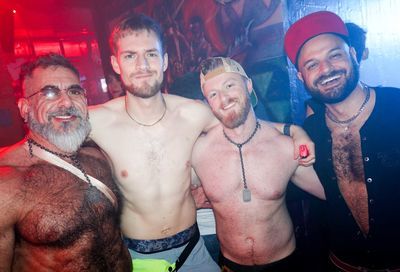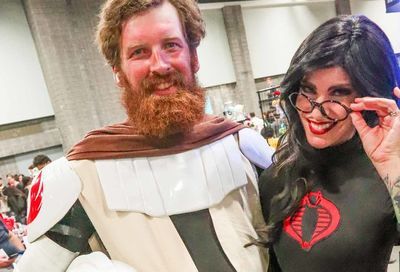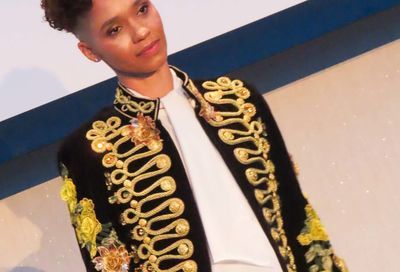Unlawfully Wed
While the Government Continues to Condemn Same-Sex Unions, More and More Churches Move Ahead
Right now, there’s a country filled with gay Christian couples thanking God that their prayers have been answered. Right now, there’s a Bible Belt packed with moralists congratulating themselves on being right about those D.C. liberals all along. And right now, there are Episcopalians, Unitarian Universalists, Reform Jews, Quakers and Lutherans wondering what the big deal is — after all, they’ve been blessing same-sex couples for years. Didn’t anyone tell you?
When the National City Christian Church in D.C. announced that they would perform same-sex commitment ceremonies, the story was given ample attention by both gay and mainstream press. The unanimous decision was made by the board of elders on December 7 after a gay couple, who are planning to adopt a child, requested a commitment ceremony from the church.
In many respects, the story warranted the media’s attention. National City is the flagship church of Disciples of Christ, a mainline denomination 800,000 believers strong. The church itself was built with money from two thousand other congregations, many of which forbid such ceremonies and may, as a result of this, decide to break from the denomination.
Furthermore, the senior pastor of the church, Reverend Dr. Alvin Jackson, is Moderator of the entire denomination, ranked second only to General Minister. He’s slated to run the Disciples’ annual General Assembly this October in North Carolina. And he’s “one of a handful ” of black religious leaders willing to take such a strong pro-GLBT stand, according to Charles Keener of National City’s Gay and Lesbian fellowship.
“In a majority-black city like Washington, where so many African-American clergy are silent or condemning [of gays and lesbians], this can’t help but have positive repercussions, ” Keener says.
Though Disciples churches act autonomously in making such decisions, Jackson is hopeful that National City’s new policy will inspire others like it.
“We will probably lose some churches, ” predicts Jackson, “but I think others will be encouraged to seriously consider this. ”
While the majority of Western religions do not officially permit same-sex commitment ceremonies, as demand grows, more and more religious leaders are finding ways to perform them anyway. Some religions prohibit the ceremonies outright; others allow them unconditionally. But many denominations — more than many people realize — fall somewhere in the sizable middle.
Oversimplifications of the issue by the media are partly to blame. On December 11, gay news website 365Gay.com reported that “two other D.C. churches [besides National City] already offer commitment ceremonies, ” citing the Metropolitan Community Church in Northwest and the Foundry Methodist Church downtown. One day earlier, however, The Washington Post had quoted Reverend Dean Snyder as stating that the United Methodist denomination “‘reaffirmed and strengthened’ its rule against the services two years ago. ” Such conflicting statements are the result of churches’ vague and inconsistently enforced rules, and have polarized an issue that, in reality, is filled with gray.
The Episcopal Church leaves a great deal of gray. At its last Convention, held two years ago, a vote to take a significant step toward developing same-sex unions was only narrowly defeated. The issue will be voted on again next year.
But even though they weren’t specifically endorsed by the Convention, Reverend Susan Blue of St. Margaret’s Episcopal Church in Dupont Circle performs the ceremonies anyway.
“The Episcopal Church has a wide spectrum of views, ” says Blue, “from very conservative to very liberal. Do most places do [same-sex ceremonies]? Absolutely not. If the Bishop said to me, ‘You may not do them,’ I wouldn’t do them. ”
But because the Bishop of the Washington diocese, John Chane, has never discouraged them, Reverend Blue has been free to perform commitment ceremonies at St. Margaret’s for the past five years with a clear conscience.
Chane, who became Bishop in June of last summer, has been loud and clear in his stance of support for the gay community. In his first sermon as Bishop, he repeatedly emphasized the notion of “all God’s children. ”
“We continue to shame the unconditional love and acceptance of Jesus Christ by living into a homophobia that has weakened our ministries and not respected the dignity of every human being, ” he proclaimed.
Chane’s position as Bishop of Washington is excellent news for the gay Episcopal community. Though parishes can determine many of their own rules, the Bishop “has a fair amount of authority over us, ” says Blue.
Reverend Randolph Charles, who performs same-sex commitment ceremonies at the Episcopal Church of the Epiphany at Metro Center, adds that the practice is “not illegal, but it’s not the norm and it’s not officially condoned. ” Still, the practice happens every day and challenges to it, says Charles, are rare.
The complexities of same-sex union rules are present in Judaism as well, which strictly prohibits same-sex unions at the Orthodox level, but not always at the Conservative level and allows them with the movement’s blessing at the Reform level. A recently-formed fourth denomination, Reconstructionist Judaism, even provides text in its ceremonial guidebook specifically for same-sex unions. Rabbi Bob Sacks of Bet Mishpachah, a GLBT synagogue, admits that determining which unions are and are not recognized can be confusing.
“Even the term ‘recognized’ is ambiguous when you’re not dealing with legal registries of marriage, ” says Sacks. “It’s sort of hard to figure out what ‘recognized’ means. I ‘recognize’ a couple as married when I’ve done a ceremony, but I also realize that I’m using civil, legal terminology. ”
The same-sex ceremonies Sacks performs are identical to the ceremonies he performs for heterosexual couples, but he says some rabbis prefer to change same-sex commitment ceremonies to make them unique. And though thinks of the concept of marriage as spiritual and fully considers the same-sex couples he blesses to be married, he understands that it’s more complicated than that.
“The ceremony effectuates a marriage, even if the civil authorities are not recording it as such. When a baby is born, it’s still a baby even if the authorities fail to record the birth. ”
Even denominations that strictly prohibit same-sex unions at every level have trouble preventing their religious leaders from performing them. Regarding Catholic priests blessing same-sex couples, Frances Kissling, President of Catholics for a Free Choice, asserts that “there is definitely a lot of that going on. ”
“It’s not recognized by the Church, ” says Kissling. “It has no official liturgical significance, but some couples do it because they want something that they think of as Catholic. Others do it as a political statement. ”
Whether or not it’s against the rules for priests to perform these is, again, nebulous territory.
“The reality is, same-sex commitment ceremonies are going on all the time, ” says Kissling. “There are gay Catholic couples having these ceremonies performed every week, just in a more private realm. I would imagine that if a priest were doing this very publicly, very frequently, someone would ask him to stop. ”
As gay relationships gain more acceptance with the public, it seems reasonable to believe that more denominations will deem them deserving of the church’s blessing. Until then, there are religious leaders willing to work within their faiths to do what they feel is moral.
“This has been a long journey, ” says Jackson of National City’s decision. “To tell you the truth, I was a little surprised. ”
Support Metro Weekly’s Journalism
These are challenging times for news organizations. And yet it’s crucial we stay active and provide vital resources and information to both our local readers and the world. So won’t you please take a moment and consider supporting Metro Weekly with a membership? For as little as $5 a month, you can help ensure Metro Weekly magazine and MetroWeekly.com remain free, viable resources as we provide the best, most diverse, culturally-resonant LGBTQ coverage in both the D.C. region and around the world. Memberships come with exclusive perks and discounts, your own personal digital delivery of each week’s magazine (and an archive), access to our Member's Lounge when it launches this fall, and exclusive members-only items like Metro Weekly Membership Mugs and Tote Bags! Check out all our membership levels here and please join us today!



















